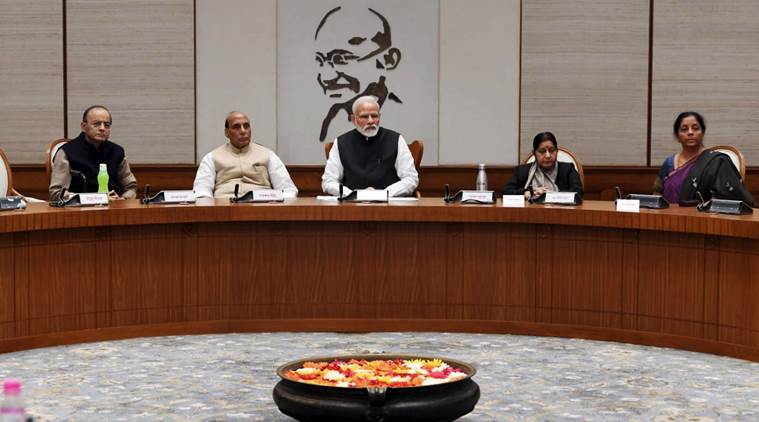Inside Track: Pulwama and after
JP hopes that the televised scenes of the farewells will work to its advantage in the elections, as was the case during the Kargil War.

Defence Minister Nirmala Sitharaman was in Sweden when she heard of the Pulwama attack. She returned to Delhi the next morning to attend the Cabinet Committee on Security. The PMO issued a circular that Arun Jaitley was resuming charge as Finance Minister so that it was possible for him to attend the CCS meet. Later, Jaitley held a press briefing outside 7, Lok Kalyan Marg, instead of at the PIB, apparently to reflect the spontaneity of the nation’s outrage. On the Prime Minister’s instructions, Sitharaman, along with the IAF top brass, worked out arrangements for the coffins of the CRPF men to be sent back to their homes with suitable honours. Eighteen aircraft lifted the 40 coffins in Delhi and transported them to designated centres across the country. Central ministers accompanied the funeral cortèges on the last leg. Amit Shah instructed BJP chief ministers to declare State mourning and ensure full State honours. The BJP hopes that the televised scenes of the farewells will work to its advantage in the elections, as was the case during the Kargil War.
Rahul’s disconnect
The buzz in Gujarat is that Alpesh Thakor, the Congress’s high-profile recruit during the Assembly polls, may switch sides to the BJP. Thakor, who was riding high in 2017, is now disillusioned. When he first joined the Congress, he had a hotline to Congress president Rahul Gandhi and bypassed the local Gujarat leadership. Now Rahul has stopped taking Thakor’s calls and the state Congress leaders want to cut him to size. Not being able to get through to Rahul is a complaint heard often. Recently, K C Deo, a five-time Lok Sabha MP from Andhra Pradesh, quit the Congress, protesting that he had been unable to get an audience with Rahul since November. Supporters of Akhilesh Yadav say that a major reason for the Samajwadi Party leader’s disillusionment with the Gandhis is that, after the defeat of the SP-Congress alliance in the 2017 state elections, Rahul stopped calling him. Himanta Biswas Sarma of Assam was among the first Congress leaders to quit the party claiming Rahul was inattentive. Congresspersons believe Rahul’s inaccessibility is partly because of poor secretarial backup. It is hoped that Priyanka will rectify this lacuna.
Father out of hand
Amar Singh left the SP because of differences with Ram Gopal Yadav, but he keeps his ear to the ground in his old party. His prediction that Akhilesh Yadav will not be able to keep his ageing father in check has proved prescient. First, Mulayam Singh Yadav embarrassed the SP by declaring in the Lok Sabha that he wanted Narendra Modi to return as PM. On Thursday, Mulayam again struck a discordant note when he announced to party workers and media personnel that Akhilesh had given far too many seats to the BSP in the tie-up and that the tickets were allotted too late. He suggested that he should handle SP ticket distribution. Amar Singh may not have formally joined the BJP but he is certainly in the RSS’s good books. He was invited as chief guest for a Rashtriya Sewa Bharati function this month. Sewa Bharati is run by top RSS leader Bhaiyaji Joshi and Singh has donated his ancestral property in Azamgarh to the association. During the election campaign, the BJP is likely to widely circulate Parliament speech endorsing Modi. The party hopes it will create confusion among Yadav voters.
Secret parleys
The ground work for the BJP-AIADMK alliance in Tamil Nadu was done so secretively that senior leaders of both parties were taken by surprise. Amit Shah reportedly utilised the services of a Tamil-speaking Gujarati businessman from Coimbatore for the initial discussions. In the AIADMK, Deputy CM O P Panneerselvam and Deputy Lok Sabha Speaker M Thambidurai, once considered Jayalalithaa’s representative in Delhi, were out of the loop, as was BJP state president Tamilisai Soundararajan. From Delhi, apart from Shah, only Piyush Goyal, the state’s election in-charge for the BJP, was in the picture. Chief Minister E K Palaniswami was the chief negotiator for the AIADMK. The big coup was getting the PMK, with its caste-based vote bank. All the same, the BJP does not expect any major miracle from this alliance.
Bucking the trend?
In his latest book, Democracy on the Road, poll pundit Ruchir Sharma has cited a statistic which could unnerve the BJP. He points out that since 1977, the Indian electorate has voted out the incumbent national or state government two-thirds of the time. His contention is that the term anti-incumbency was popularised, if not coined, in India. Will Modi be able to buck the trend?










.png)




























No hay comentarios:
Publicar un comentario